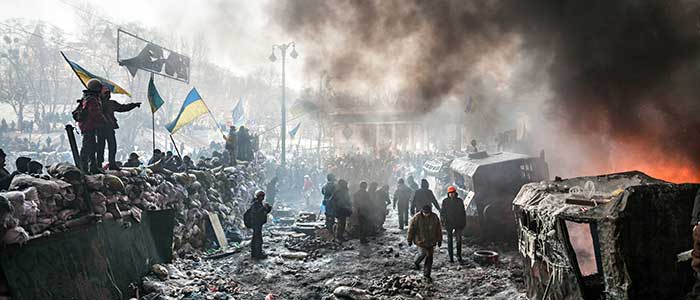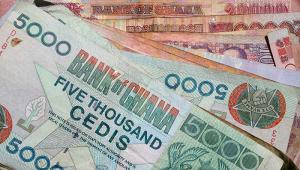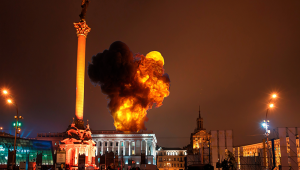Web_Ukraine_shutterstock_173329988.jpg

Mass anti-government protests in Kiev, Ukraine January 2014
The status of the Eurobond, which had previously been in dispute, dictates that Ukraine must repay the debt to Russia by 20 December 2015. If it does not, Russia has indicated that it will sue.
The IMF said: “In the case of the Eurobond, the Russian authorities have represented that this claim is official. The information available regarding the history of this claim supports that representation.”
The bond was issued and purchased via the Irish stock exchange, which under UK law makes it a private contract. Ukrainian authorities also argued that the loan did not come directly from the Russian government but from the country’s National Wealth Fund.
In contrast, Russia has long maintained that the bond came from the NWF only because the Russian budget could not allocate the money at the time. However, it says it was always state-sanctioned and a government-to-government loan.
The IMF has upheld this view based on that fact that the bond was acquired because of a decision by the Russian government, which is backed up by public statements at the time, and because the NWF’s investment guidelines did not permit investment in Ukrainian bonds and therefore a specific government decision was needed to amend them.
Previously, Ukraine had argued that the bond should not be part of the rules of an IMF bailout package that requires the country to make good on its sovereign debts.
Until a recent change in IMF policy that allows the IMF to continue to support to countries that are in arrears with their bilateral creditors, default on payment risked the continuation of the fund’s financial aid to Ukraine’s struggling economy.
The bond was part of a December 2013 deal struck between Moscow and Ukraine’s then-president Viktor Yanukovich in the midst of a financial crisis triggered by the Euromaiden uprising. It was the first tranche of a $20bn bailout ‒ $15bn in Eurobonds and a $5bn discount on national gas imports.
The bailout was suspended, however, when Ukraine’s president and government were ousted in 2014, but Russia has held the bond over Ukraine’s head ever since.
Moscow could demand repayment of the bond at any time if Ukraine defaulted on its other public debt to the country or if Ukraine’s public debt-to-GDP ratio exceeded 60% ‒ which at times it did over the two years of the bond’s issuance. Cross-default clauses meant that if Ukraine defaulted on its loan to Russia it would automatically default on all of its other eurobonds.
After continued failure to reach an agreement between Ukraine and its other private creditors, with Russia refusing to be involved in negotiations and having the potential to block any deal, in October Ukraine managed to secure a restructuring arrangement with all of its other creditors which included a $3bn haircut.
It was reported in November that Russia proposed a restructuring plan for the bond at the G20 Summit in Turkey, but insisted that this would have to be guaranteed by the US, the European Union or any major bank, none of which accepted.
Ukraine is now required to repay the bond within a 10-day grace period that begins when the bond expires on 20 December.
Ukraine has said it cannot offer Russia a better deal than the terms it has agreed with its other creditors but also cannot spare $3bn from its budget. Ukrainian president Petro Poroshenko has labelled the payment an illegal bribe, paid to Ukraine to keep the country out of a European Union trade pact and preserve its close ties with Russia.
The change in IMF policy means that Ukraine will not be cut off from the lender’s support and will have help whatever happens next.
The Kremlin reacted sharply to the change in IMF lending policy, which it said had no legal basis. It accused the IMF of meddling to help “crooks” in Kiev for political reasons.
The IMF decision yesterday, however, falls in Russia’s favour. But some have noted that it might be beneficial for Ukraine to have to service its debt to Moscow in order to free itself from at least one strand of Russia’s influence.













